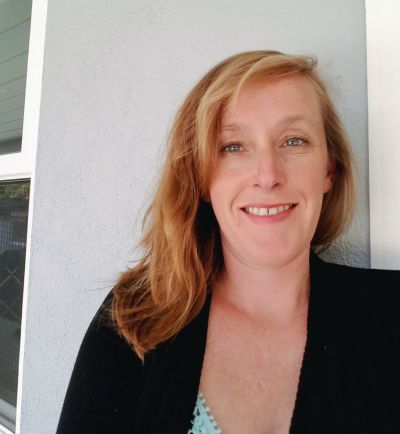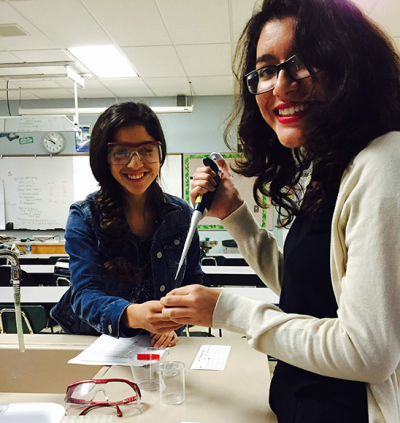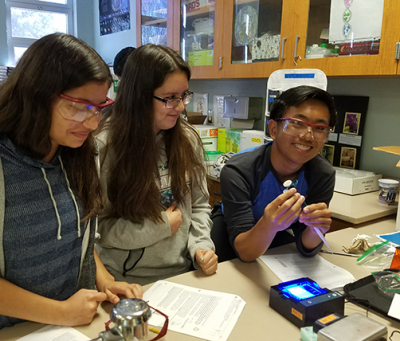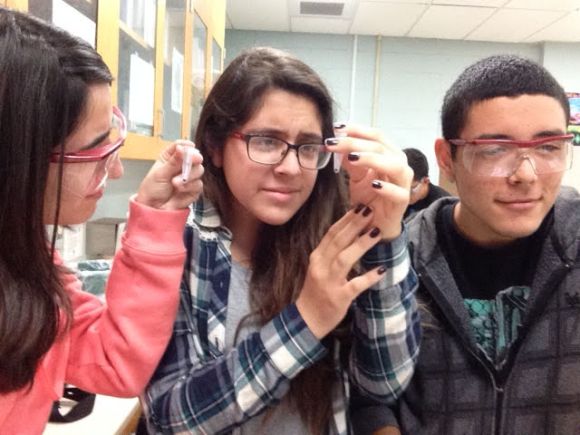I don't think that you can replace the experience of conducting a bacterial transformation in the lab with anything from a book. To go through all the steps in person was a valued learning experience for me. If you watch someone play guitar, you'll never learn it until you start fiddling around with the strings.
-Kamille Romero, ABE student
Kamille Romero is one of many students who has reaped not only the great benefit of hands-on learning in biotechnology but also the great benefit of having Jocelyn White as her teacher. A science teacher for 16 years, White is at the forefront of the Amgen Biotech Experience (ABE) in Southern California, where she teachers AP Biology.
White first learned about ABE through Carol Fujita, who mentored her when she was a student teacher. After completing her training, White was hooked. “The most rewarding thing is the level of student engagement in the labs,” she says. “I give a survey every year at the end of my course, and students consistently mention the ABE lab sequence as one of their favorite activities.” She values the program both for instilling in students the importance of biology and biotechnology in their lives and society and for how it helps students visualize themselves as actual scientists.

White’s school, Pacifica High School in Oxnard, is one of the largest in Ventura County, with more than 3,000 students, 83% of whom are listed as socioeconomically disadvantaged. The majority of students at Pacifica are Hispanic, and for many of them, her class is their first AP class. Pacifica draws from several different middle and junior high schools, as well as different school districts, resulting in widely varying levels of foundational science for students there. “In spite of the differences, Jocelyn provides all that is needed to ensure her students' success in her rigorous AP Biology class,” says Fujita, who is the coordinator for the ABE-Greater Los Angeles Area’s Ventura County distribution center.
“Most students only have vague ideas about biotechnology when we start the ABE unit in my class. They know it somehow relates to GMOs, cloning, or maybe forensics from CSI, so they are very curious and have a lot of great questions,” she explains. “Doing the lab sequences opens their eyes to career opportunities that they may have never considered otherwise.”

One of her favorite teaching moments was when a former student, Alicia Romero (Kamille Romero’s sister) returned to her classroom and told White that she had participated in the Amgen Scholars Program in college and was now pursuing her Ph.D. “It’s nice to think she may have been inspired by some of the activities in my class,” White says.
For White, science has always been her passion. When she finished college, she did some substitute teaching and realized she liked the energy and curiosity of high school students. “Now as a high school science teacher, I get to talk about what I love, do fun labs, and share that passion with others,” she says. “Can’t get any better than that!”

White actively pursues funding to purchase equipment for her students to experience a wide range of biotech labs – everything from gel electrophoresis units to centrifuges to water baths. “Once we have all these things, we will be self-sufficient at Pacifica to conduct a variety of biotech-related labs,” she says.
White loves seeing the enthusiasm of her students in taking on these labs. “Students get very excited when they learn that they will be manipulating real DNA samples and ultimately growing genetically transformed bacteria,” she says. “At first, students are really nervous to handle the equipment and samples, but by the end of the lab sequence they are quite proficient and are very proud of their new skills.”
